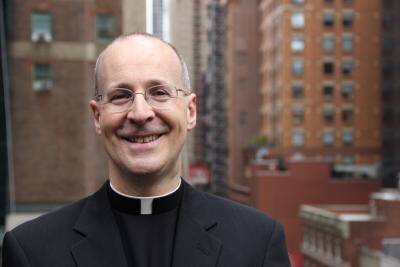I can’t remember being so inspired by so many young people in such a short period of time. They came from across the country, from Jesuit high schools, colleges and universities—by car, bus, train and plane. Perhaps the most epic journey was made by a group of students from Creighton University who piled into a bus for a very long ride from Omaha to Washington, D.C.
Bedraggled, bleary-eyed and bearing big backpacks, over 1,200 students, as well as faculty members, administrators and campus ministers, gathered on the third weekend of November for the Ignatian Family Teach-In for Justice. I was dazzled by the gathering and, most of all, by the presence of the Holy Spirit among these amazing young men and women.
Let me begin by explaining the ungainly name. “Ignatian Family” refers to the community of Jesuit high schools, colleges, parishes and retreat houses, as well as institutions and individuals inspired by Ignatian ideals. The teach-in is an outgrowth of a gathering previously associated with the annual School of the Americas Watch, itself partly an outgrowth of outrage over the death of six Jesuits and their companions, who were martyred in El Salvador on Nov. 16, 1989. Nineteen of the 26 soldiers involved in the murders had been trained at the U.S. Army’s School of the Americas at Fort Benning, Ga. By the mid-1990s many Jesuit schools were taking part in the S.O.A. Watch on that November weekend; and from 1998 to 2009, a teach-in was held to educate students in Catholic social teaching. In 2010, the teach-in moved to Washington, D.C., largely so the students could engage in advocacy on Capitol Hill.
You may smile at that last fact. But the descent of the Jesuit-educated students upon the offices of lawmakers was described to me by Christopher Kerr, executive director of the Ignatian Solidarity Network, which organized the teach-in, as the “largest Catholic lobbying day of the year.”
The energy of the teach-in—during the keynote addresses, in smaller sessions on topics like the death penalty, suicide prevention, poverty, abortion, immigration and prayer or just in the hallways—was astonishing. For the first time I began to understand how fulfilling it must be to work as a teacher or campus minister in a Jesuit school. It was touching to have students speak to me about books of mine that they had read in class. And I have never been asked for so many hugs in my entire life.
“You look tired,” I said to one college student. “Yeah,” he said, “I was on the bus for about a million hours, and I was right underneath one of the speakers, and they were playing a movie, so I didn’t sleep.” By way of encouragement, I suggested that tonight, in his hotel room, he might be able to rest. He screwed up his face eloquently. “Well, Father, I’m with four other guys in a room with two beds—and I’ve got the floor!” Then he smiled. “But I’m psyched to be here!”
Around 10 p.m. on Saturday night, I was invited to join the Jesuit priests and brothers, perhaps 25 in all, for a prayer service in the immense hotel conference room. Each Jesuit was handed a votive candle. Someone, we were told, would announce the names of all the Jesuits who have been martyred around the world since 1972. A few years thereafter, Pedro Arrupe, S.J., superior general of the Society of Jesus, reminded Jesuits that working with the poor, and for justice, would come with a price. Are we, he asked of Jesuits, “ready to take up this responsibility and to carry it out to its ultimate consequence? Ready to enter upon the more severe way of the cross? If we are not ready for this, what other use would these discussions have, except perhaps merely an academic one?”
As a guitar player began strumming, I thought perhaps 20 or so names would be read. There were 52—so many that members of the Jesuit Volunteer Corps brought up the final candles. As each name was read, 1,200 of us said, “¡Presente!” Present. We are here.
Who was there? The Jesuits who had gone before us, martyred in places like El Salvador, but also Chad, China, Ghana and Jamaica. My Jesuit brothers—who walk with me in my Jesuit life—were there too. As were all those students, with their beautiful souls, who would come after us, and who would offer their youth, their joy and their enthusiasm to spread the Gospel and work for justice.
I was glad to be there. I was glad I was presente.








